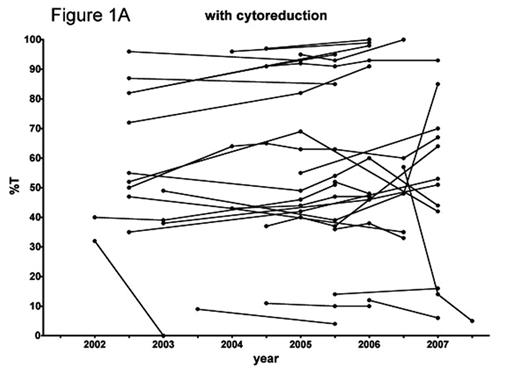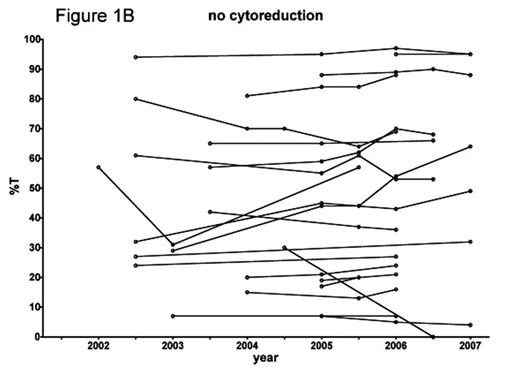Abstract
An acquired somatic mutation in the JAK2 gene (JAK2-V617F) is frequently found in patients with myeloproliferative disorders (MPD). In most studies the JAK2-V617F mutation has been analyzed at single time point. Here we performed a retrospective single center study on 73 MPD patients (36 polycythemia vera (PV), 29 essential thrombocythemia (ET), and 8 primary myelofibrosis (PMF)) from whom at least two blood samples (mean=5, range 2–17) were available with an interval of at least 8 months. The mean follow-up period was 35±17 months (range 8–78 months). The allelic ratio of JAK2-V617F (%T) was determined in DNA from purified peripheral blood granulocytes by allele-specific PCR. In 73 MPD patients studied, 53 (73%) carried the JAK2-V617F mutation (32 PV, 18 ET, 3 PMF). None of the 20 patients negative for JAK2-V617F acquired the JAK2-V617F mutation during the observation period (n=20, mean number of samples=4). In the majority of the JAK2-V617F positive patients (35/53; 66%) the JAK2-V617F allelic ratios remained remarkably stable during the follow-up period (variation ±5%T) (Figure 1 A and B). In 10/53 patients (19%) we observed an increase and in 8/53 (15%) a decrease in JAK2-V617F allelic ratio greater than 5%T. Interestingly, 3/10 patients (1 ET and 2 PV) who showed increase of JAK2-V617F developed secondary myelofibrosis. Twenty six patients (49%) received cytoreductive treatment (hydroxyurea: 24, interferon alpha: 1, anagrelide: 1). Cytoreduction with hydroxyurea did not significantly reduce the JAK2-V617F allelic ratios (Figure 1A) compared to untreated patients (Figure 1B). The only molecular remission was seen in one patient treated with interferon alpha (Figure 1 A). In one patient without cytoreduction JAK2-V617F became undetectable because of transformation to acute myeloid leukemia with blast cells negative for JAK2-V617F. A second patient treated with hydroxyurea showed a pronounced decrease of JAK2-V617F (–47%T in 6 months), but no clinical or laboratory signs of leukemic transformation were present. We conclude that the amount of JAK2-V617F remains very stable in a majority of JAK2-V617F positive patients. Prospective studies will help to elucidate whether increasing JAK2-V617F allelic ratios can predict secondary myelofibrosis or decreasing allelic ratios in absence of cytoreductive therapy (e.g. interferon alpha) are early signs of leukemic transformation.
Author notes
Disclosure: No relevant conflicts of interest to declare.



